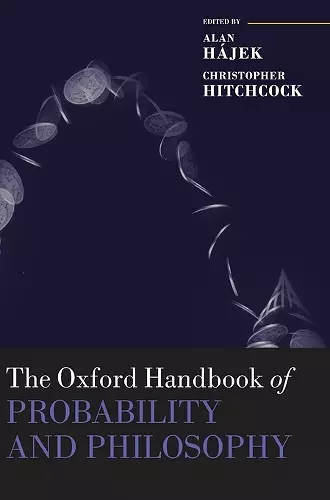The Oxford Handbook of Probability and Philosophy
Alan Hájek editor Christopher Hitchcock editor
Format:Hardback
Publisher:Oxford University Press
Published:8th Sep '16
Currently unavailable, and unfortunately no date known when it will be back

Probability theory is a key tool of the physical, mathematical, and social sciences. It has also been playing an increasingly significant role in philosophy: in epistemology, philosophy of science, ethics, social philosophy, philosophy of religion, and elsewhere. A case can be made that probability is as vital a part of the philosopher's toolkit as logic. Moreover, there is a fruitful two-way street between probability theory and philosophy: the theory informs much of the work of philosophers, and philosophical inquiry, in turn, has shed considerable light on the theory. This Handbook encapsulates and furthers the influence of philosophy on probability, and of probability on philosophy. Nearly forty articles summarise the state of play and present new insights in various areas of research at the intersection of these two fields. The articles will be of special interest to practitioners of probability who seek a greater understanding of its mathematical and conceptual foundations, and to philosophers who want to get up to speed on the cutting edge of research in this area. There is plenty here to entice philosophical readers who don't work especially on probability but who want to learn more about it and its applications. Indeed, this volume should appeal to the intellectually curious generally; after all, there is much here to be curious about. We do not expect all of this volume's audience to have a thorough training in probability theory. And while probability is relevant to the work of many philosophers, they often do not have much of a background in its formalism. With this in mind, we begin with 'Probability for Everyone--Even Philosophers', a primer on those parts of probability theory that we believe are most important for philosophers to know. The rest of the volume is divided into seven main sections: History; Formalism; Alternatives to Standard Probability Theory; Interpretations and Interpretive Issues; Probabilistic Judgment and Its Applications; Applications of Probability: Science; and Applications of Probability: Philosophy.
I have found this volume to be a handy resource for both research and teaching, not least because the articles are in large part accessible and well written. * Weng Hong Tang, Australasian Journal of Philosophy *
This monumental book comprises thirty seven essays written by experts in various areas in the intersection of probability and philosophy ... As a personal resource on probability and its applications, it is unparalleled in both scope and informativeness. ... The book would also be useful in a high-level undergraduate or graduate course on probability. The essays are written with the aim, not so much of advancing current debates, but of bringing the reader up to speed on recent developments and current states of affairs. This is convenient for the reader looking to educate herself; it is easy to learn a great deal from this book ... The essays here are consistently of high quality. This is a superb resource. * Chris Dorst, Metascience *
ISBN: 9780199607617
Dimensions: 252mm x 185mm x 51mm
Weight: 1604g
878 pages